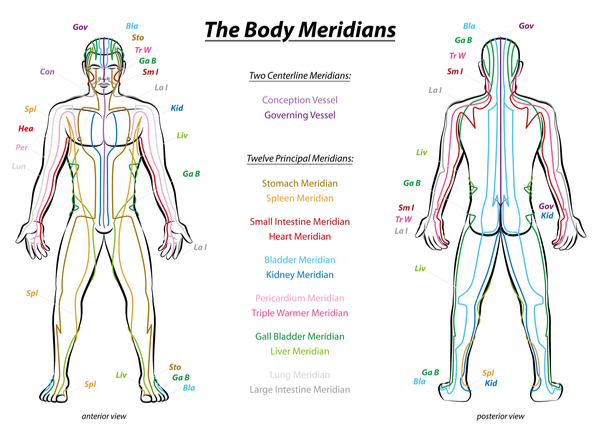
“Meridian lines” is a term used in various natural therapies with acupuncture being possibly the best known. They are invisible lines that carry life energy throughout your body. There are points along these called which are called meridian points. The meridian lines of the person cannot be seen or felt like the other body systems such as the nervous or circulatory system. When a person is in excellent health, their meridian lines will be open and clear of blockage.
Also called channels of energy or Qi, the meridian lines can be associated with the functioning of the internal organs of the body. If you are in a healthy condition, the energy will freely flow through the meridians. If there is an abnormal functioning of the internal organs, or there is an occurrence of an abnormal external stimulation, the energy will become stagnant in meridians and can cause illness. To cure the illness, the flow of energy must be normalised, and the blockage released. The whole meridian can be evenly worked on, concentrating upon specific meridian points.
The Twelve Main Meridian Lines
The twelve main meridian lines in your body are named after the six “zang” and the six “fu” organs. The relationship between the meridian and the organ exists in the functioning of the organs instead of the actual organ itself.
The Lung Meridian
It is the intake of Qi energy from the air to be used by the body, and to build up resistance against any external intrusions. It also eliminates gases that are not needed by the body through exhalation.
The Large Intestine Meridian
This meridian helps the lungs’ functioning, and secretes and excretes from inside and outside the body. It also prevents Qi energy from becoming stagnant.
The Spleen Meridian
It is involved in digestion and the fermentation process. In modern terms, the spleen is considered as being the pancreas, and the pancreas govern general digestion, and reproductive hormones related to the breasts and ovaries. Mental fatigue has a negative effect on the spleen and a lack of exercise will cause problems with digestion and also with the secretion of hormones.
The Stomach Meridian
This meridian is involved in the functioning of the stomach, esophagus, and duodenum, and also the functioning of the reproductive, lactation, ovary, and appetite mechanism. It is also involved in the menstrual cycle in women.
The Heart Meridian
This meridian represents compassion and thus governs emotions and the spirit. It is also responsible for blood circulation and the total body through the brain and the five senses. It is also the mechanism that adapts external stimulation to the internal environment of the body.
The Small Intestine Meridian
The small intestine meridian governs the total body through the digestion and displacement of food. Anxiety, anger, nervous shock, and emotional excitement can affect blood circulation, and the small intestine can actually cause stagnation of the blood that affects the whole body.
The Kidney Meridian
The kidney controls the spirit and energy to the body and governs resistance against mental stress by controlling the secretions of the hormones. It is also responsible in detoxifying and purifying the blood.
The Bladder Meridian
This meridian is related to the mid-brain which coordinates with the kidney system and the pituitary gland. Connected to the autonomic nervous system, it is also related to the reproductive and urinary organs. It is also responsible for excreting urine away from the body.
The Heart Constrictor (Pericardium) Meridian
It acts as a supplemental function of the heart related to the circulatory system, including the heart sac, the cardiac arteries and the system of veins and arteries. It is also responsible for the total nutrition of the body.
The Triple Heater (Sanjao) Meridian
It acts as a supplemental function of the small intestine, and also controls the spirit and visceral organs that circulate Qi energy to the entire body. It also protects the functioning of the lymphatic system. The upper heat is connected to the chest, the middle heat to the solar plexus, and the heat above the navel and below heat is associated with the peritoneum, including the circulation to the extremities.
The Liver Meridian
It stores nutrients and energy in time for physical activities. It also helps the body to resist against disease and supplies, analyses and detoxifies the blood to maintain physical energy.
The Gall Bladder Meridian
It is responsible for the distribution of nutrients throughout the body and balances the total energy with the help of internal hormones and secretions which include bile, saliva, gastric acid, insulin, and intestinal hormones.

|
Do you have a natural health & wellness business? |









